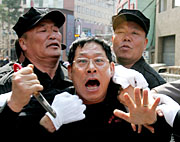|
| ||
|
April 06, 2005
You are on the invidual archive page of Closing Pandora's box. Click Simon World weblog for the main page.
|
|
Closing Pandora's box
The protests against Japan continue to grow across China and South Korea as well. The sparks have been ignited by a row over Japanese history textbooks and Japan's bid to join the UN Security Council (UNSC), kicked along by various Japanese claims on islands dear to South Korea or China. It's lead to boycotts, online petitions and protests. It's even lead to the strange tradition of self-stabbing (see extended entry for the latest example). But China's Government has a problem. These protests might serve its need to claim nationalist legitimacy now it is no longer Communist, but it hinders China's desire to be a more global power. Often China has been accused of narrowly following its self-interest in global issues rather than adopting a broader view more fitting for a permanent member of the UNSC. The reform of the UNSC is a key challenge for China. The most likely is China will abstain when it comes time to vote for Japan's seat, but that would be at the expense of also endorsing other new members such as Germany, India and Brazil. So China's Government has found public opinion and nationalist fervour is slipping out of its control. What to do? The SCMP: Communist Party censors have acted over the rising tide of anti-Japanese sentiment nationwide, ordering all media to drop coverage of public protests against the Japanese government and companies. "No media coverage on anti-Japanese protests [should be allowed]. Journalists should not participate in or conduct interviews to do with anti-Japanese activities," the circular said.IT will be interesting to see if the anti-Japan fire can survive without the oxygen of official media coverage. Further reading: Gov't in Quandary over attempts to blog Japan's UN bid covers the dilemma facing the Chinese leadership. Winston Marshall says China has already put the kybosh on the UNSC reforms and isn't interested in reform.
Trackbacks:
TrackBack URL for this entry: http://blog.mu.nu/cgi/trackback.cgi/73975 Send a manual trackback ping to this post. Chinamerican Threat Roundup 1 Excerpt: This news story recounts recent riots in China over Japanese textbooks. At the Riding Sun (a must-read on Far Eastern affairs), the Gaijin Biker points to a good blog roundup on the anti-Japanese protests at Simon World. Weblog: Gus Van Horn Tracked: April 16, 2005 09:42 AM
Comments:
Simon, Digressing from this just a bit, it may be interesting to note this (India's first prime minister) Jawaharlal Nehru "declined a United States offer" to India to "take the permanent seat on the United Nations Security Council" around 1953 and suggested that it be given to China, according to the United Nations Under-Secretary General, Shashi Tharoor. In his latest book, "Nehru — The Invention of India," Mr. Tharoor writes that Indian diplomats who have seen files swear that Nehru declined the offer about the same time as he turned down "with scorn" John Foster Dulles' support for an Indian Monroe Doctrine. Nehru had suggested that the seat, till then held by Taiwan, be offered to Beijing instead. He wrote that "the seat was held with scant credibility by Taiwan." [Shashi Tharoor] posted by: Nitin on 04.06.05 at 12:52 PM [permalink]Sorry with the mixup on the blockquote tag on the previous comment. Premature tagclosation ;-) There's this belief among some Indian commentators that while China may not veto India's position, it may abstain from the vote; they call it the 'historical debt' theory. posted by: Nitin on 04.06.05 at 12:57 PM [permalink]It'll indeed be interesting to see if Beijing can successfully rein in the nationalistic fervor it helped to spawn in opposition to Japan. Japan certainly isn't helping matters, as this interesting FT commentary piece points out. The party inherited its mantle and has almost continuously held power for five decades. Media whitewashing of the war legacy thus helps bolster LDP legitimacy, while friendly reporting on current issues furthers LDP policy objectives. These include a permanent seat on the UN Security Council and rewriting Japan's pacifist constitution. I suspect that these feelings of intense nationalism have transcended the control of the governments that coaxed them into being. Divisions between Japan and China are naturally deepening as the two powers compete over resources and influence, and Japan's return to a more proactive foreign policy has stirred up resentment in mainland China and Korea over past colonial abuses. Politically, the Chinese government will ultimately be able to circumvent any national feelings it finds unhelpful. The danger is perhaps more economic; as recent riots have shown, Chinese nationalism has threatened Japanese property, and may conceivably lead to a chilling effect on the volume of trade between the two countries. posted by: Winston Marshall on 04.06.05 at 01:06 PM [permalink]Nitin, if that's true then it has to go down as one hell of a mistake by Nehru. How interesting to think what the world would have been like if he had taken the seat and China didn't get one.... Winston: I agree with your conclusion but I'm not sure China can control what is now assuming a life of its own, hense the title of the post. Simon, I read a great paper in the following. Everyone must read it. The China Factor and the Overstretch of the US Hegemony FIRST STORY STORY NUMBER TWO
... http://www.gurusonline.tv/uk/conteudos/gu_report.asp In regards to China's security council position. Their platform has been almost singularly non-interventionist except in rare occassions where it felt that the resolutions accutely threatened Chinese interests. China (PRC+RoC) has only exercised the veto a total of 5 times, possibly preferring to use bureaucratic obstructions to prevent a vote even coming up as others have mentioned. Compare this to France's 18 vetos, the UK's 32 vetos, the US's 79 vetos, and the Soviet Union/Russia's 122 vetos. posted by: Jing on 04.07.05 at 01:46 AM [permalink] |
|
